词汇学-莆田学院
- 格式:doc
- 大小:39.00 KB
- 文档页数:8
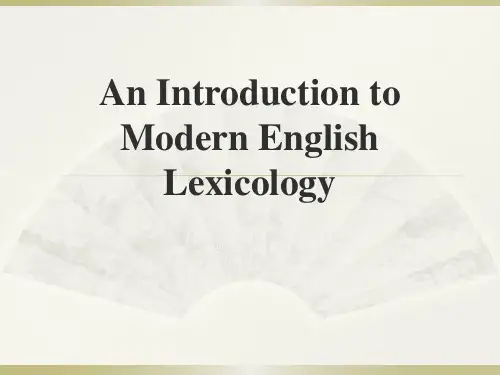
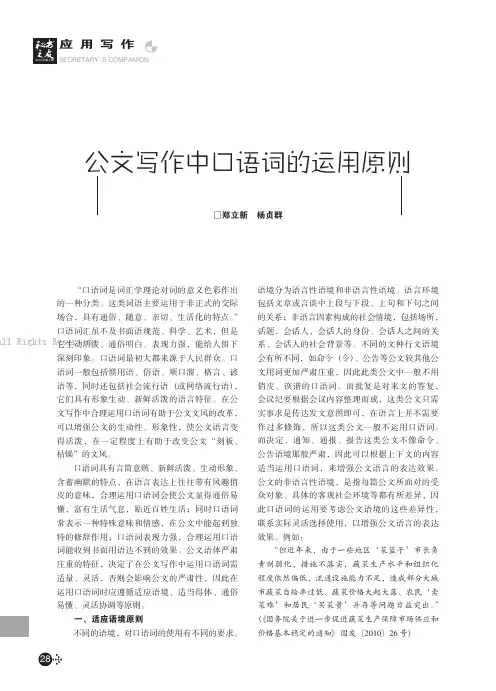
SECRETARY’S COMPANION□郑立新杨贞群公文写作中口语词的运用原则“口语词是词汇学理论对词的意义色彩作出的一种分类。
这类词语主要运用于非正式的交际场合,具有通俗、随意、亲切、生活化的特点。
”口语词汇虽不及书面语规范、科学、艺术,但是它生动活泼、通俗明白、表现力强,能给人留下深刻印象。
口语词最初大都来源于人民群众。
口语词一般包括惯用语、俗语、顺口溜、格言、谚语等,同时还包括社会流行语(或网络流行语),它们具有形象生动、新鲜活泼的语言特征。
在公文写作中合理运用口语词有助于公文文风的改革,可以增强公文的生动性、形象性,使公文语言变得活泼,在一定程度上有助于改变公文“刻板、枯燥”的文风。
口语词具有言简意赅、新鲜活泼、生动形象、含蓄幽默的特点,在语言表达上往往带有风趣俏皮的意味,合理运用口语词会使公文显得通俗易懂,富有生活气息,贴近百姓生活;同时口语词常表示一种特殊意味和情感,在公文中能起到独特的修辞作用;口语词表现力强,合理运用口语词能收到书面用语达不到的效果。
公文语体严肃庄重的特征,决定了在公文写作中运用口语词需适量、灵活,否则会影响公文的严肃性,因此在运用口语词时应遵循适应语境、适当得体、通俗易懂、灵活协调等原则。
一、适应语境原则不同的语境,对口语词的使用有不同的要求。
语境分为语言性语境和非语言性语境。
语言环境包括文章或言谈中上段与下段、上句和下句之间的关系;非语言因素构成的社会情境,包括场所,话题,会话人,会话人的身份、会话人之间的关系、会话人的社会背景等。
不同的文种行文语境会有所不同,如命令(令)、公告等公文较其他公文用词更加严肃庄重,因此此类公文中一般不用俏皮、诙谐的口语词。
而批复是对来文的答复,会议纪要根据会议内容整理而成,这类公文只需实事求是传达发文意图即可,在语言上并不需要作过多修饰,所以这类公文一般不运用口语词。
而决定、通知、通报、报告这类公文不像命令、公告语境那般严肃,因此可以根据上下文的内容适当运用口语词,来增强公文语言的表达效果。
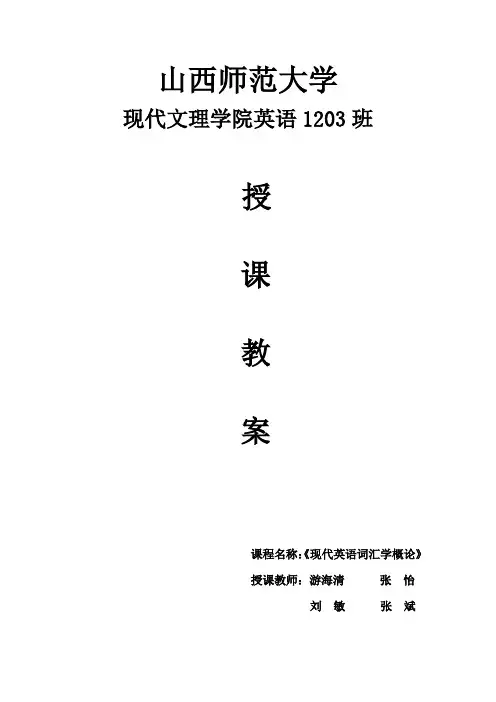
山西师范大学现代文理学院英语1203班授课教案课程名称:《现代英语词汇学概论》授课教师:游海清张怡刘敏张斌构词法教案课题: WORD-FORMATION(I)授课教师:游海清教材:现代英语词汇学概论第 3 章第 1-4 节P 31 ~P 71一、教学目标:1、知识目标:a.了解构词法的一些基本知识和观点b.明确合成法的定义c.掌握合成法的分类d.了解派生法及转化法的定义e.熟练掌握派生法及转化法的分类f.明确常见前后缀的词义2、能力目标:a.提升学生记忆单词的能力b.理解构成的新词的意义c.扩大词汇量,提升阅读水平二、教学重点:合成法派生法转化法三、教学难点:转化法四、教学方法:讲授法问答法 PPT演示练习法课堂讨论法对比法五、教具仪器:多媒体粉笔教案教材六、授课提纲:七、教学内容详析第一节General remarks 第一步:T:OK,class,let’s begin.How many processes of word-formation do you know ?Do you know differences between root,stem and base?第二步:A.percentage of new wordspounding or composition(about 27%)B.Derivation or affixation(about 17.5%)C.Conversion(about 10.5%)A.initialisms and acronyms(about 9%)B.Blending(about 6%)C.Clipping(about 2%)D.Words from proper names(about 2%)E.Back formation(about 1%)F.Reduplication(about 0.5%)G.Neo-classical formations(about 4%)H.Others (about 3%)B.Some basic concepts of word-formation1.The differences between “root”, “stem” and “base”?Root/ 词根: is not further analyzable, either in terms of derivational or inflectional morphologyStem/ 词干: the part of the word-form which remains when all inflectional affixes have been removed.Base/ 词基: any form to which affixes of any kind can be added.举例:1)undesirables= un + desire + able + sBase:desirable→ desire (base)undesirable→ desirable (base)undesirables→ undesirable (base)Base/词基: any form to which affixes of any kind can be added.分析:desirable: desire(root or base, not stem)undesirable: desirable(base, not root, not stem)undesirables: undesirable(stem or base, not root)desired: desire(root, stem or base)第三步:1)denationalizeddenationalized = de + nation + al + ize + dRoot:nationStem:denationalizeBase:national→ nationnationalize→ nationaldenationalize→ nationalizedenationalized→ denationalize2)Uncomfortable=un +comfort+ableRoot: comfortStem:uncomfortableBase:comfortable第二节:Compounding第一步:板书下列单词1.noun compoundsHeadache heartbeat crybabyPickpocket birthcontrol housekeeping2.adjective compoundsThunder-struck weather-beaten suntannedFault-finding peaceloving record-breaking3.verb compoundsHouse-keep ghost-write aircondition mass-produce第二步:A.DefinitionCompounding / composition: a word-formation process consisting of joining two or more bases to form a new unit.e.g.flowerpot= flower + potmachine-independent= machine + independentThe relative criteria of a compound 1) Orthographic criterion:Compounds are written in three ways, that is, solid,hyphenated and open.E.g. flowerpotSolid: flowerpotHyphenated: flower-pot Open: flower pot2) Phonological criterion:C ompound accent: a main stress on the first element andsecondary stress on the second element.Normal phrase accent: a secondary stress on the firstelement and the main stress on the second element.E.g.black listblackboardblue bottle3) Semantic criterion:Semantically, compounds can be said to have a meaning whichmay be related to but cannot always be inferred from the meaningB.Classification1)noun compoundsA.Subject and verbB.verb and objectC.verb and adverbialD.subject and objectE.restrictive relationF.appositive relation2)adjective compoundsA.subject and verbB.verb and objectC.verb and adverbialD.noun and adjectiveE.coordinating relationship3)verb compoundsA.back-formationB.Conversion第三步:做P66-P67练习第三节 Derivation第一步:T:OK,class,let’s begin.Un-uncomfortable unimportant unclean unable unclear unknown Unlike uncertainIm-impossible impatient impair impracticable impolite imbalance immoral impartial impassive imprisonDis-dislike dismiss disclose disrupt disabuse disadvantage disable discharge display disagreeEr(or)-actor teacher doctor driver writer rider commander worker traveller collector farmer cooker baker stranger foreignerAble-actionable companionable comfortable disable livable reliable accountable reasonable fashionable impressionable Ize-civilize symbolize realize naturalize socialize characterize revolutionize materialize第二步:A.definition:Derivation / affixation: a process of forming new words by the addition of a word element, such as a prefix, suffix or combining form, to an already existing word.e.g.recover= re + coverworker= work + erB.classification(一)Prefixation: adding a prefix or combining form to the base.do not generally alter the word-class of the base.1)classification of prefixes1. negative prefixes (反意前缀): un-, non-, in-(im-, il-, ir-), dis-, a-2. reversative / privative prefixes(相反动作前缀): un-, de-, dis-,3. pejorative prefixes (贬义前缀): mis-, mal-, pseudo-4. prefixes of degree or size(等级与大小前缀): arch-, super-, out-, sub-, over-, under-, hyper-, altra-, mini-5. prefixes of attitude(态度取向前缀): co-, counter-, anti-, pro-6. locative prefixes(方位前缀): super-, sub-, inter-, trans-7. prefixes of time and order(时间顺序前缀): for-, pre-, post-, ex-, re-8. number prefixes(常用数字前缀): uni-/mono-, bi-/di-, tri, multi-/poly-9. miscellaneous prefixes: auto-, neo-, pan-, proto-, semi-, vice- 1.2)brief description of some productive prefixes in current English1. ant- / anti-Anti-Japanese War抗日战争ant- / anti-: unlike tradition2.de-A.to undo or reverse .Eg: decentralize decolonize denationalizeB.to removeEg: defog debug delocalize denuclearize3.mini-A.very smll size,duration,or importanceEg: minibus minibike minicab miniparkB.shortEg: minidress miniskirt minicoat minisuit4.un-A.not,the opposite ofEg: unkind unsee unbendingB.reverse the actionEg: unpack untieC.release from or to deprive ofEg: unleash unhorse(二)Suffixation: suffixation is the formation of a new word by adding a suffix or a combining form to the base, and usually changing the word-class of the base.1)classification of suffixes1.noun suffixes:2.Verb suffixes:3.Adjective suffixes:4.Adverb suffixes:2)brief description of some productive suffixes in current English.1.-able2.-er(or)3.-in4.-ish5.-ize6.-y3)differentiating suffixesEg:-ic and -ical第三步:引导学生口头总结第四节conversion第一步:绕口令1.never trouble trouble till trouble troubles you2.Can you can a can as a canner can can a can 你能像罐头工人那样把罐头装进罐头盒子里吗?3.I wish to wish the wish you wish to wish,but if you wish the wish the witch wishes,i won’t Wish the wish you wish to wish 我愿许你所许,若你的愿望太过虚幻不切实际,我就不会许你所许(我就不会和你一起天真的去幻想了第二步:A.introductory remarks1 )Conversion is a word-formation process whereby a word ofa certain word-class is shifted into a word of another word-class without the addition of an affix.functional shift:concerned with usage only not with word-formation derivation by zero suffix:long and cumbersome; clarify only something minor, not crucial2)conversion as a result of the almost entire loss of inflection in modern English.B.tapes of conversion1.noun→verb conversion(a) to put in/on N.The workers canned apples.put apples in cansThis room was floored with titles.cage birdsThe question certainly cornered me.He pocketed his wallet.(b) to give / provide N.They sheltered the orphans.give shelter to the orphanspills coated with sugarsugared pillsThe bottle is labeled poison.The child rose from the ground plastered over with yellow clay.(c) to remove N.Bill weeded the garden.cut off weeds in the gardencore an applepeel an orangedust a cap(d) to do sth. with N.John braked the car.stopped the car with a brakescrew the two pieces togetherelbow one’s way through the crowd(e) to act as N.She mothered the orphan. (human n.)looked after the orphan like a motherTom parroted what the boss had said. (animal n.)repeat sth. like a parrotThe police shadowed the suspected spy. ( inanimate n.) follow the spy closely like a shadow(f) to make / change sth. into N.(g) to send sth. / go by N.(h)to spend the period of time denoted by N.2.verb→noun conversion(a) He had a desire to be a scientist.desired to be a…state of mind / sensation(b) His usual morning commute to workan act of commuting event /activitydynamic verbsThis kind of nouns usually occur following verbs like give, have, make, or take, and are preceded by the indefinite article.(c) This little restaurant is quite a find.sth. found, esp. sth. valuable or pleasingobject or result of v.(d) He is a great bore.He is a person who bores everyone.agent of v.(e) The cloth is a good cover for the table.I covered the table with a cloth.instrument of v.3.adjective→verb conversion(a) pale, slim, sourto become the adj.(b) free, warm, smoothto cause sb. / sth. to become the adj.4.adjective→noun conversion(a) Partial conversionthe poorthe Scotch / the Japanesethe roughthe latest / his bestthe accused(b) Complete conversionHe is a natural for the job.Tom is one of our regulars.5.Other conversions第三步:布置作业八、预期效果学生能熟练运用合成法、派生法、转化法以及掌握由三大构词法构成的新词的意义。
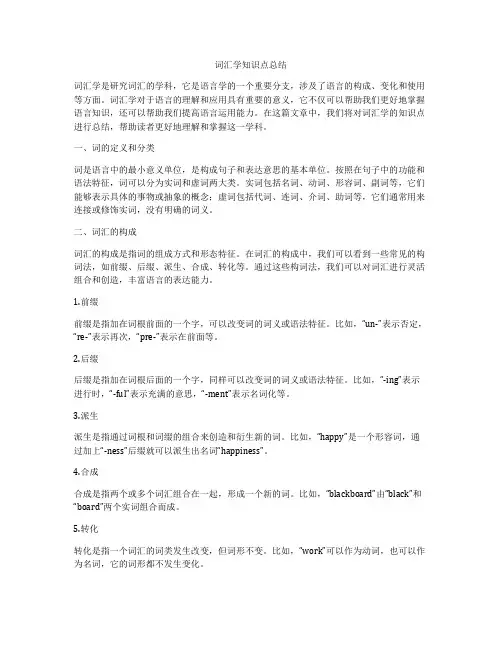
词汇学知识点总结词汇学是研究词汇的学科,它是语言学的一个重要分支,涉及了语言的构成、变化和使用等方面。
词汇学对于语言的理解和应用具有重要的意义,它不仅可以帮助我们更好地掌握语言知识,还可以帮助我们提高语言运用能力。
在这篇文章中,我们将对词汇学的知识点进行总结,帮助读者更好地理解和掌握这一学科。
一、词的定义和分类词是语言中的最小意义单位,是构成句子和表达意思的基本单位。
按照在句子中的功能和语法特征,词可以分为实词和虚词两大类。
实词包括名词、动词、形容词、副词等,它们能够表示具体的事物或抽象的概念;虚词包括代词、连词、介词、助词等,它们通常用来连接或修饰实词,没有明确的词义。
二、词汇的构成词汇的构成是指词的组成方式和形态特征。
在词汇的构成中,我们可以看到一些常见的构词法,如前缀、后缀、派生、合成、转化等。
通过这些构词法,我们可以对词汇进行灵活组合和创造,丰富语言的表达能力。
1.前缀前缀是指加在词根前面的一个字,可以改变词的词义或语法特征。
比如,“un-”表示否定,“re-”表示再次,“pre-”表示在前面等。
2.后缀后缀是指加在词根后面的一个字,同样可以改变词的词义或语法特征。
比如,“-ing”表示进行时,“-ful”表示充满的意思,“-ment”表示名词化等。
3.派生派生是指通过词根和词缀的组合来创造和衍生新的词。
比如,“happy”是一个形容词,通过加上“-ness”后缀就可以派生出名词“happiness”。
4.合成合成是指两个或多个词汇组合在一起,形成一个新的词。
比如,“blackboard”由“black”和“board”两个实词组合而成。
5.转化转化是指一个词汇的词类发生改变,但词形不变。
比如,“work”可以作为动词,也可以作为名词,它的词形都不发生变化。
词汇的构成方式是多种多样的,通过学习这些构词法,我们可以更好地理解和掌握词汇的形态特征,有助于提高我们的语言表达能力。
三、词汇的语义特征语义是指词汇所携带的意义,它是语言交流和理解的基础。
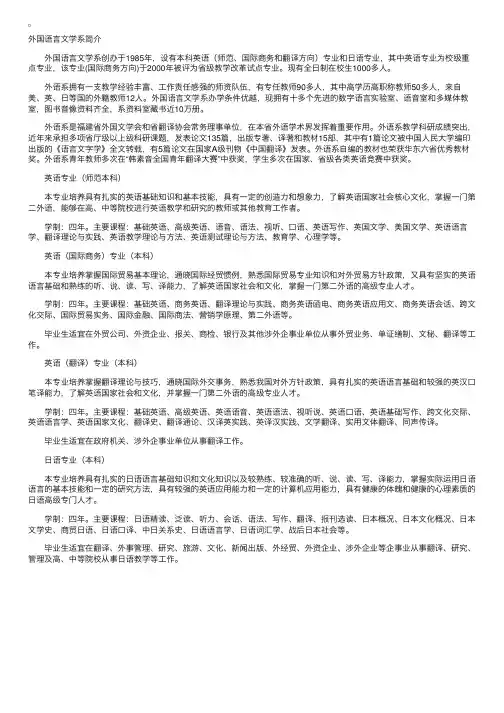
外国语⾔⽂学系简介 外国语⾔⽂学系创办于1985年,设有本科英语(师范、国际商务和翻译⽅向)专业和⽇语专业,其中英语专业为校级重点专业,该专业(国际商务⽅向)于2000年被评为省级教学改⾰试点专业。
现有全⽇制在校⽣1000多⼈。
外语系拥有⼀⽀教学经验丰富、⼯作责任感强的师资队伍,有专任教师90多⼈,其中⾼学历⾼职称教师50多⼈,来⾃美、英、⽇等国的外籍教师12⼈。
外国语⾔⽂学系办学条件优越,现拥有⼗多个先进的数字语⾔实验室、语⾳室和多媒体教室,图书⾳像资料齐全,系资料室藏书近10万册。
外语系是福建省外国⽂学会和省翻译协会常务理事单位,在本省外语学术界发挥着重要作⽤。
外语系教学科研成绩突出,近年来承担多项省厅级以上级科研课题,发表论⽂135篇,出版专著、译著和教材15部,其中有1篇论⽂被中国⼈民⼤学编印出版的《语⾔⽂字学》全⽂转载,有5篇论⽂在国家A级刊物《中国翻译》发表。
外语系⾃编的教材也荣获华东六省优秀教材奖。
外语系青年教师多次在“韩素⾳全国青年翻译⼤赛”中获奖,学⽣多次在国家、省级各类英语竞赛中获奖。
英语专业(师范本科) 本专业培养具有扎实的英语基础知识和基本技能,具有⼀定的创造⼒和想象⼒,了解英语国家社会核⼼⽂化,掌握⼀门第⼆外语,能够在⾼、中等院校进⾏英语教学和研究的教师或其他教育⼯作者。
学制:四年。
主要课程:基础英语、⾼级英语、语⾳、语法、视听、⼝语、英语写作、英国⽂学、美国⽂学、英语语⾔学、翻译理论与实践、英语教学理论与⽅法、英语测试理论与⽅法、教育学、⼼理学等。
英语(国际商务)专业(本科) 本专业培养掌握国际贸易基本理论,通晓国际经贸惯例,熟悉国际贸易专业知识和对外贸易⽅针政策,⼜具有坚实的英语语⾔基础和熟练的听、说、读、写、译能⼒,了解英语国家社会和⽂化,掌握⼀门第⼆外语的⾼级专业⼈才。
学制:四年。
主要课程:基础英语、商务英语、翻译理论与实践、商务英语函电、商务英语应⽤⽂、商务英语会话、跨⽂化交际、国际贸易实务、国际⾦融、国际商法、营销学原理、第⼆外语等。
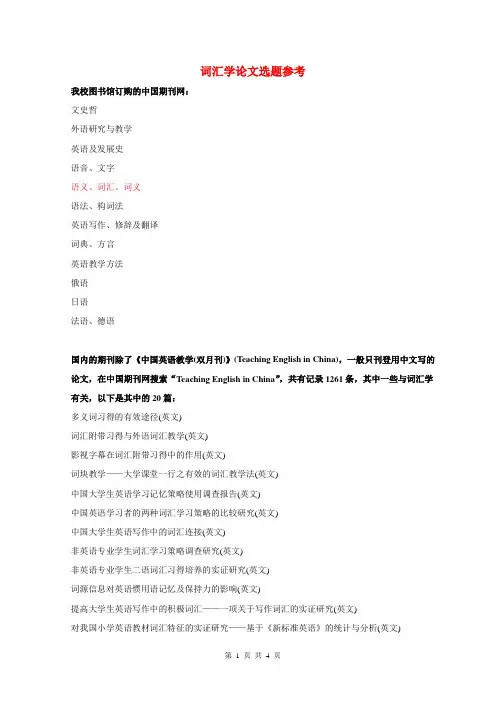
词汇学论文选题参考我校图书馆订购的中国期刊网:文史哲外语研究与教学英语及发展史语音、文字语义、词汇、词义语法、构词法英语写作、修辞及翻译词典、方言英语教学方法俄语日语法语、德语国内的期刊除了《中国英语教学(双月刊)》(Teaching English in China),一般只刊登用中文写的论文,在中国期刊网搜索“Teaching English in China”,共有记录1261条,其中一些与词汇学有关,以下是其中的20篇:多义词习得的有效途径(英文)词汇附带习得与外语词汇教学(英文)影视字幕在词汇附带习得中的作用(英文)词块教学——大学课堂一行之有效的词汇教学法(英文)中国大学生英语学习记忆策略使用调查报告(英文)中国英语学习者的两种词汇学习策略的比较研究(英文)中国大学生英语写作中的词汇连接(英文)非英语专业学生词汇学习策略调查研究(英文)非英语专业学生二语词汇习得培养的实证研究(英文)词源信息对英语惯用语记忆及保持力的影响(英文)提高大学生英语写作中的积极词汇——一项关于写作词汇的实证研究(英文)对我国小学英语教材词汇特征的实证研究——基于《新标准英语》的统计与分析(英文)实词搭配与语法搭配,哪个能力更弱些?(英文)跨语言间搭配差异与英语词汇教学(英文)英语专业本科生一外和二外词汇学习观念策略对比研究(英文)高水平大学学生词汇知识发展实证研究(英文)词源信息对英语惯用语记忆及保持力的影响(英文)根据语料库看高级学习者词典中的relation和relationship(英文)中、日大学生英语词汇知识剖析(英文)单词接触频率对中国学生顺带式习得英语词汇的影响(英文)“语义、词汇、词义”方面的中文论文更多,例如:意义的七种类型和英语词汇教学朱亚夫外语与外语教学2005/09文化在英语新词构成中的表现_试析_gate及其合成词语杨永林西北师大学报1997/01英语和汉语中有关“猫”和“狗”的习语比较何云亭四川理工学院学报(社会科学版) 2006/S2中英网络聊天用语词汇分析阮丽吉林广播电视大学学报2006/03英汉拟声词对比万石建外语研究2006/05动词happen、occur和“发生”的语言差异性探究——一项基于英汉语料库的调查与对比分析张继东外语研究2006/05论英汉词汇的显性和隐性性别歧视张伟香湘潭师范学院学报(社会科学版) 2006/06语用原则对分析英语幽默的作用——兼论《老友记》的语用幽默李蜜蜜文教资料2006/30从框架理论看词汇语码转换陈蕾牡丹江教育学院学报2006/05汉英称谓语的文化解读李英洛阳大学学报2006/03基于语料库的中国新闻英语主题词研究高超北京第二外国语学院学报2006/06析英语广告文体的词汇特点梁萍职大学报2006/03英汉“生理现象”委婉语对比探析赵娟娟阜阳师范学院学报(社科版) 2006/04基于语料库的英语近义词辨析陈琳三峡大学学报(人文社会科学版) 2005/S1英语中的性别语言黄天琪职业技术2006/12现代美语词汇发展的几个趋势戴卫平四川理工学院学报(社会科学版) 2006/02英汉网络词汇构建方式的比较研究泮幼萍现代语文(语言研究版) 2006/05论英语中女性语言的特点和对女性的语言性别歧视现象李红艳中山大学研究生学刊(社会科学版) 2005/02英语数字习语的文化探源李丽西安欧亚学院学报2005/04英语习语的文化内涵(英文) 贾秀珍无锡南洋学院学报2006/02说“PK” 李明霞现代语文(语言研究版) 2006/05英语成语及其变体的理解策略(英文) 魏汝尧Teaching English in China-CELEA Journal 2005/06 语料库对同义词研究的贡献(英文) 卢鹿Teaching English in China-CELEA Journal 2005/06基于成分分析框架的二语词汇教学贺义辉泸州职业技术学院学报2006/01英语课程标准词汇统计分析杨春陇东学院学报(社会科学版) 2006/01美国英语中黑人英语变体的研究王妍江苏外语教学研究2005/01网络英语中的俚语张子琴英语知识2006/07莎士比亚与英语词汇(43) 杨俊峰英语知识2006/07英语短语动词语义构成的认知探索王朝培西南民族大学学报(人文社科版) 2006/09浅谈英语词汇中的借词崔萍铜陵职业技术学院学报2006/02莱可夫隐喻理论探析——来自当代英语词汇隐喻语料库的检验章国新莆田学院学报2006/04 英汉词汇互借对语言文化的影响甘成英绵阳师范学院学报2006/03美语俚语的发展及其特点杜皓高等教育与学术研究2006/03注意“颜”外之意Simon 今日中学生2006/26英语形容“漂亮女孩”知多少同学2006/05英语成语折射出的英国民族文化特点黄丽辉康定民族师范高等专科学校学报2006/03常用电影俚语词汇集萃钱乐奕海外英语2006/Z2美国生活俗语看过来高素菊海外英语2006/Z2语用预设——美国2000年总统大选第二场辩论分析徐黄丽文教资料2006/21网络英语新词词义探析杜彦强昆明师范高等专科学校学报2006/02浅谈计算机英语的词汇特点莫佳科技广场2006/05浅析现阶段英语外来语词“汉语化”现象邹妍高等教育与学术研究2006/01通过因特网进行英语词汇教学策略(英文) 金长革鞍山师范学院学报2006/03新闻英语中的汉语借词谭梦玲文教资料2006/14从英语中汉语借词看中国文化的影响陶岳炼台州学院学报2006/02浅析希腊神话对英语词汇的影响吴光亭绥化学院学报2006/02对英语词语新义的研究高永伟上海翻译2006/02从英语谚语看英格兰民族的爱情观、婚姻观惠燕徐州工程学院学报2006/05英语有关“笑”的词汇谭新星中国科技翻译2006/02英汉习语文化历史溯源刘宁吉林工程技术师范学院学报2006/02浅谈英汉植物词语的文化涵义和翻译汪莹景德镇高专学报2006/01英汉动物词的文化内涵差异及其翻译单瑶景德镇高专学报2006/01禁忌语的运用与《泰坦尼克号》王琼湖北成人教育学院学报2006/03英汉词汇空缺类型及成因的文化分析赵文学长春师范学院学报2006/05对汉英动物义位陪义的对比研究于屏方语文学刊2006/03澳大利亚英语的词汇特色张沉香外语教学2006/02Jackendoff概念语义学述评刘晓林外语教学2006/02澳大利亚英语的语言特点黄秀兰汕头大学学报(人文科学版) 1994/04英国英语与美国英语的词汇差异对比研究隋志娟中国成人教育2006/01独具特色的澳大利亚英语张煤外语与外语教学1995/03澳大利亚、新西兰英语的特点刘国辉四川师范学院学报(哲学社会科学版) 1995/01 澳大利亚英语词汇中折射出的澳大利亚历史孙雁广西大学梧州分校学报2004/02 新西兰英语的特点刍议王永祥张家口师专学报1994/02美国英语与英国英语的语音差异张蜀青岛远洋船员学院学报1995/03。
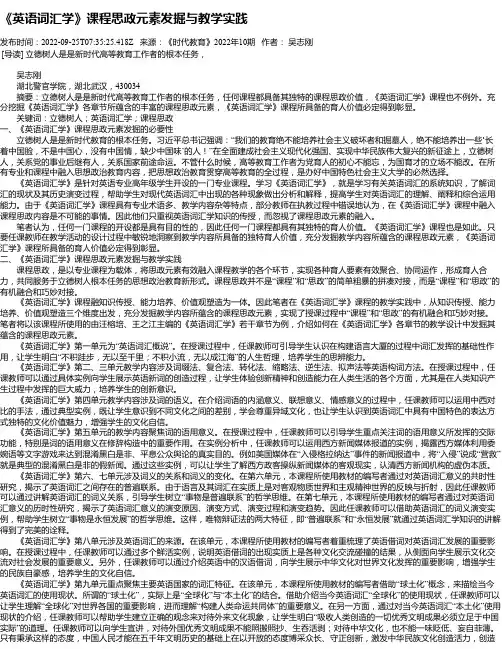
《英语词汇学》课程思政元素发掘与教学实践发布时间:2022-09-25T07:35:25.418Z 来源:《时代教育》2022年10期作者:吴志刚[导读] 立德树人是是新时代高等教育工作者的根本任务,吴志刚湖北警官学院,湖北武汉,430034摘要:立德树人是是新时代高等教育工作者的根本任务,任何课程都具备其独特的课程思政价值,《英语词汇学》课程也不例外。
充分挖掘《英语词汇学》各章节所蕴含的丰富的课程思政元素,《英语词汇学》课程所具备的育人价值必定得到彰显。
关键词:立德树人;英语词汇学;课程思政一、《英语词汇学》课程思政元素发掘的必要性立德树人是是新时代教育的根本任务。
习近平总书记强调:“我们的教育绝不能培养社会主义破坏者和掘墓人,绝不能培养出一些‘长着中国脸,不是中国心,没有中国情,缺少中国味’的人!”在全面建成社会主义现代化强国、实现中华民族伟大复兴的新征途上,立德树人,关系党的事业后继有人,关系国家前途命运。
不管什么时候,高等教育工作者为党育人的初心不能忘,为国育才的立场不能改。
在所有专业和课程中融入思想政治教育内容,把思想政治教育贯穿高等教育的全过程,是办好中国特色社会主义大学的必然选择。
《英语词汇学》是针对英语专业高年级学生开设的一门专业课程。
学习《英语词汇学》,就是学习有关英语词汇的系统知识,了解词汇的现状及其历史演变过程,帮助学生对现代英语词汇中出现的各种现象做出分析和解释,提高学生对英语词汇的理解、阐释和综合运用能力。
由于《英语词汇学》课程具有专业术语多、教学内容杂等特点,部分教师在执教过程中错误地认为,在《英语词汇学》课程中融入课程思政内容是不可能的事情。
因此他们只重视英语词汇学知识的传授,而忽视了课程思政元素的融入。
笔者认为,任何一门课程的开设都是具有目的性的,因此任何一门课程都具有其独特的育人价值。
《英语词汇学》课程也是如此。
只要任课教师在教学活动的设计过程中敏锐地洞察到教学内容所具备的独特育人价值,充分发掘教学内容所蕴含的课程思政元素,《英语词汇学》课程所具备的育人价值必定得到彰显。
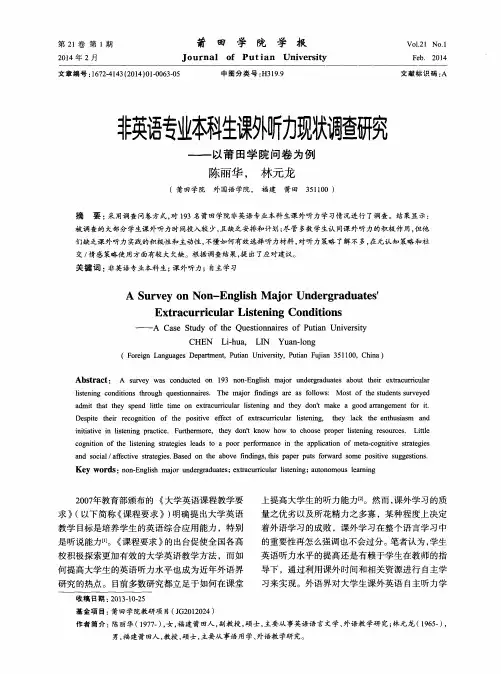
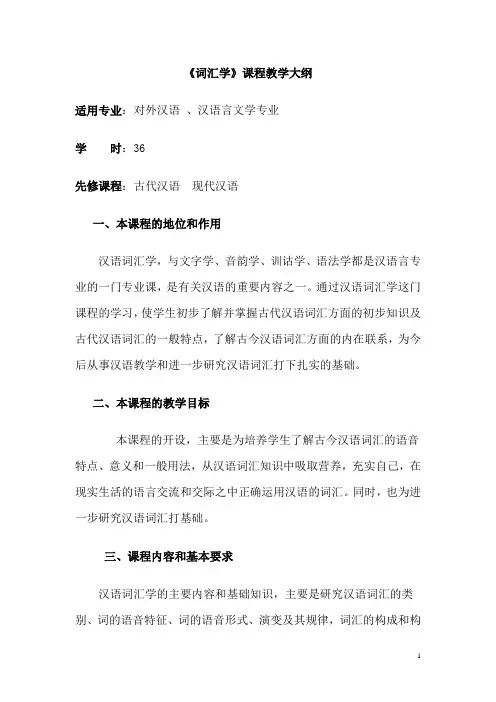
《词汇学》课程教学大纲适用专业:对外汉语、汉语言文学专业学时:36先修课程:古代汉语现代汉语一、本课程的地位和作用汉语词汇学,与文字学、音韵学、训诂学、语法学都是汉语言专业的一门专业课,是有关汉语的重要内容之一。
通过汉语词汇学这门课程的学习,使学生初步了解并掌握古代汉语词汇方面的初步知识及古代汉语词汇的一般特点,了解古今汉语词汇方面的内在联系,为今后从事汉语教学和进一步研究汉语词汇打下扎实的基础。
二、本课程的教学目标本课程的开设,主要是为培养学生了解古今汉语词汇的语音特点、意义和一般用法,从汉语词汇知识中吸取营养,充实自己,在现实生活的语言交流和交际之中正确运用汉语的词汇。
同时,也为进一步研究汉语词汇打基础。
三、课程内容和基本要求汉语词汇学的主要内容和基础知识,主要是研究汉语词汇的类别、词的语音特征、词的语音形式、演变及其规律,词汇的构成和构成方式、词义及词义特点、词义的演变、古今词义的异同、词的同义反义现象、同类词、同源词、同音词,词汇研究的方式、手段、词汇学史等方面的内容,要求对这些知识有个一般的了解和基本的掌握,最好能够运用这些知识去研究汉语中所出现的具体的语言现象。
第一章序论一、词汇学的对象和分科1、任何语言都有自己的语音系统、词汇和语法构造,语言的这三个组成部分在语言学上都有相应的学科来进行研究。
词汇学就是其中以词和词汇作为研究对象的一门学科。
所谓词汇就是语言里的词和词的等价物(如固定词组)的总和。
词汇中包括实词和虚词,词汇学的研究重点是实词。
因为有的虚词词汇意义已经弱化,有的甚至完全失去了词汇意义,只剩下语法意义,所以它们主要是语法学研究的对象。
2、在中国语言学史上,词汇的研究比语音和语法的研究都开始得早,这就是所谓训诂”。
最古的一部训诂书《尔雅》写成于西汉时代。
到了清朝乾嘉时代。
训诂学更有了高度的发展,段玉裁(1735--1815)、王念孙(1744--1832),王引之(1766--1834)等人把这门学问推进到了一个崭新的历史阶段。
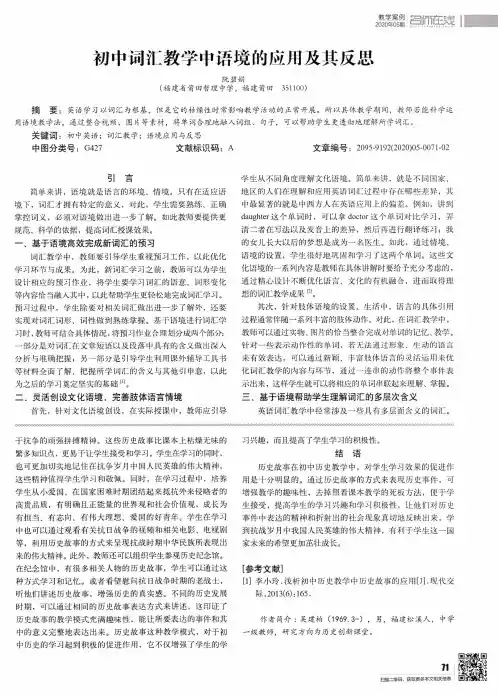
2器岛f.'初中词汇教学中语境的应用及其反思阮碧娟(福建省莆田哲理中学,福建莆田351100)扌商要:英语学习以词汇为根基,但是它的枯燥性时常影响教学活动的正常开展。
所以具体教学期间,教师若能科学运用语境教学法,通过整合视频、图片等素材,将单词合理地融入词组、句子,可以帮助学生更透彻地理解所学词汇。
关键词:初中英语:词汇教学;语境应用与反思中图分类号:G427文献标识码:A文章编号:2095-9192(2020)05-0071-02引言简单来讲,语境就是语言的环境、情境。
只有在适应语境下,词汇才拥有特定的意义,对此,学生需要熟练、正确掌控词义,必须对语境做出进一步了解。
如此教师要提供更规范、科学的依据,提高词汇授课效果。
一、基于语境高效完成新词汇的预习词汇教学中,教师要引导学生重视预习工作,以此优化学习环节与成果。
为此,新词汇学习之前,教师可以为学生设计相应的预习作业,将学生要学习词汇的语意、词形变化等内容恰当融入其中,以此帮助学生更轻松地完成词汇学习。
预习过程中,学生除要对相关词汇做出进一步了解外,还要实现对词汇词形、词性做到熟练掌握。
基于语境进行词汇学习时,教师可结合具体情况,将预习作业合理划分成两个部分:一部分是对词汇在文章短语以及段落中具有的含义做出深入分析与准确把握,另一部分是引导学生利用课外辅导工具书等材料全面了解、把握所学词汇的含义与其他引申意,以此为之后的学习奠定坚实的基础!11o二. 灵活创设文化语境,完善肢体语言情境首先,针对文化语境创设,在实际授课中,教师应引导学生从不同角度理解文化语境。
简单来讲,就是不同国家、地区的人们在理解和应用英语词汇过程中存在哪些差异,其中最显著的就是中西方人在英语应用上的偏差。
例如,讲到daughter这个单词时,可以拿doctor这个单词对比学习,弄清二者在写法以及发音上的差异,然后再进行翻译练习:我的女儿长大以后的梦想是成为一名医生。
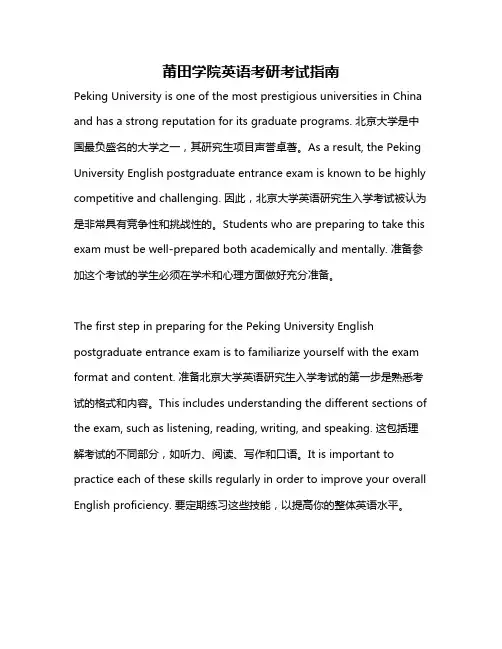
莆田学院英语考研考试指南Peking University is one of the most prestigious universities in China and has a strong reputation for its graduate programs. 北京大学是中国最负盛名的大学之一,其研究生项目声誉卓著。
As a result, the Peking University English postgraduate entrance exam is known to be highly competitive and challenging. 因此,北京大学英语研究生入学考试被认为是非常具有竞争性和挑战性的。
Students who are preparing to take this exam must be well-prepared both academically and mentally. 准备参加这个考试的学生必须在学术和心理方面做好充分准备。
The first step in preparing for the Peking University English postgraduate entrance exam is to familiarize yourself with the exam format and content. 准备北京大学英语研究生入学考试的第一步是熟悉考试的格式和内容。
This includes understanding the different sections of the exam, such as listening, reading, writing, and speaking. 这包括理解考试的不同部分,如听力、阅读、写作和口语。
It is important to practice each of these skills regularly in order to improve your overall English proficiency. 要定期练习这些技能,以提高你的整体英语水平。
非英语专业大学生英语自主学习能力研究陈赛芳;林元龙【摘要】“自主学习”是指以学生为教学中心,强调学习者在学习过程中的决定性作用的学习模式.主要通过对莆田学院非英语专业一、二年级本科生进行问卷调查,旨在探究非英语专业大学生拥有的英语自主学习能力情况.结果显示:大部分非英语专业大学生自主学习能力普遍低下.他们学习动机和学习目标浅薄,不懂制定有效的学习计划,缺乏学习英语的自信心,对学习策略了解甚少,无法对自己学习进行监控或正确的评估.根据调查结果,分析原因并提出相应的有效措施,以期有效提升非英语专业大学生英语自主学习能力,促进教学质量.【期刊名称】《长治学院学报》【年(卷),期】2015(032)003【总页数】4页(P95-98)【关键词】非英语专业;大学生;自主学习能力;调查研究【作者】陈赛芳;林元龙【作者单位】莆田学院外国语学院,福建莆田351100;莆田学院外国语学院,福建莆田351100【正文语种】中文【中图分类】H319.3自主学习的基本概念最早兴起于20世纪60年代左右,HenriHolec(1981)首次将“自主性”(autonomy)这一概念引入外语教学。
自主学习的基本模式主要是以学生为教学中心,强调学习者在学习过程中的决定性作用,与以往传统的教学模式存在较大的差异。
2007年教育部正式颁发的《大学英语课程教学要求》明确指出,大学英语教学的目标是培养学生的英语综合应用能力……,同时增强其自主学习能力,……以适应我国社会发展和国际交流的需要[1]1。
就一定程度上来说,“增强其自主学习能力”是当下推行素质教育的核心所在。
学习者只有掌握学习主动权,才能在将来毕业进入社会后继续学习,以适应时代发展的必然需求以及满足自身发展的内在需求,实现持续性的终身学习方式。
国内外不少专家学者对自主性外语学习进行了探讨分析,但主要研究集中在自主学习的理论依据、重要性、及其培养方法、实施策略和实践结果等方面。
大学英语中的词汇教学
林爱玉
【期刊名称】《岱宗学刊-泰安教育学院学报》
【年(卷),期】2005(009)003
【摘要】词汇学习不是单一的对概念意义的学习及对生词的掌握,而是一个复杂的、积极的、多层次的认知过程,外语教师只有意识到学生在学习单词中存在的困难及
问题,才能在教学中采取相应的措施来培养学生对词汇学习产生兴趣,有效地记忆词汇、应用词汇,最终形成听、说、读、写、译的全面提高.
【总页数】3页(P106-108)
【作者】林爱玉
【作者单位】福建莆田学院,外语系,福建,莆田,351100
【正文语种】中文
【中图分类】H313.1
【相关文献】
1.任务型词汇教学法在大学英语词汇教学中的应用 [J], 胡蓉
2.互动输出中的大学英语词汇教学——基于ESL教学法的大学英语课堂词汇教学
设计 [J], 李剑
3.语料库在大学英语词汇教学中的应用研究——基于读后续写对词汇教学的思考[J], 王倩
4.语义成份分析法在英语词汇教学中的应用——大学英语词汇教学新探 [J], 刘强;张波
5.语料库在大学英语词汇教学中的应用研究——基于读后续写对词汇教学的思考[J], 王倩
因版权原因,仅展示原文概要,查看原文内容请购买。
非英语专业学生英语口语现状实证调查研究——以莆田学院
为例
陈丽芳
【期刊名称】《福建师大福清分校学报》
【年(卷),期】2011(000)003
【摘要】以问卷调查及口试的形式,通过定量分析和描述性统计,对非英语专业学生的英语口语现状作了调查和探讨,发现了如下问题:学生对于一些口语能力因素的认同还存在模糊性;在英语交流中听得懂却说不出,口语能力整体中等偏下,特别是在交际策略的应用上很薄弱,这在很大程度上导致学生无法自然、流利进行交流;渴望提高英语口语水平,却未能运用恰当的学习策略;过分依赖课堂,对课堂满意度却不高;未能自觉创造和利用课后的英语口语训练语境,课后自主学习的意识和积极性较低.文章在对以上问题分析的基础上,对大学英语教学提出了一些改进建议.
【总页数】6页(P77-82)
【作者】陈丽芳
【作者单位】莆田学院外语系,福建莆田,351100
【正文语种】中文
【中图分类】H319.9
【相关文献】
1.地方本科院校非英语专业学生英语口语现状调查与分析--以楚雄师范学院为例[J], 侯丽香
2.非英语专业本科生课外听力现状调查研究——以莆田学院问卷为例 [J], 陈丽华;林元龙
3.非英语专业大学生英语口语教学现状及对策——以贵州师范学院为例 [J], 张茂君
4.非英语专业大学生英语口语现状调查与对策--以北京石油化工学院为例 [J], 巢鑫迪;王妍陶;张巍然
5.非英语专业学生大学英语口语学习现状调查研究\r——以上饶师范学院为例 [J], 张玮;杨继林
因版权原因,仅展示原文概要,查看原文内容请购买。
Introduction1.T he Nature and Domain of English LexicologyDefinition : What is lexicology?Lexicology is a branch of linguistics, inquiring into the origins and meanings of words(WNWD: Webster’s New World Dictionary of the American Language 1980) 2.W hat is the nature and scope of English Lexicology?The nature of English Lexicology :English lexicology is a theoretically-oriented course. It is chiefly concerned with the basic theories of words in general and of English words in particular . In the meantime it is a practical course, for it has sth to do with words.The scope of English Lexicology: English lexicology aims at investigating and studying the morphological structures of English and word equivalents, their semantic structures , relations, historical development,formation and usages.3.I ts Relation to other Disciplines(学科)What subjects is English Lexicology correlated with ? And to what extent? English lexicology is correlated with morphology, semantics, etymology(词源学), stylistics and lexicography(词典学). In the discussion of the inflections of words and word-formation and how morphemes(词素) are combined to form words and words to form sentences, it has sth to do with morphology(形态学). Chinese is pictograph ,but English is not. We still can find some traces of pictograph in some English words such as the word “eye”, “bed”(Maybe the interpretations sound a bit forced(牵强附会). Words like agonize/agony, ache, atingle…these words begin with letter A which is considered to the tip of a pin.In the discussion of how a small vocabulary of the languages of early Germanic tribes has developed into a huge vocabulary of ModernEnglish and how words change their forms and meaning, it has sth to with etymology. In the discussion of polysemy(多义关系), homonymy(同形同音异义关系),synonymy, antonymy, hyponymy(上下文关系) and semantic field of words, it is related with semantics. And in the discussion of the stylistic values of words , it is related with stylistics. And in the discussion of acquiring the knowledge and information of lexis in the aspect of language use, English lexicology is relevant to lexicography.4. Methods of study(How does a student of English study English lexicology?)Two approaches: We have two approaches to the study of English words, namely synchronic(共时) and diachronic(历时). From a synchronic point of view , words can be studied at a point in time, regardless of whatever changes. From a diachronic point of view, we can consider words historically , looking into their origins and changes in formsand meaning. These two ways are complementary. As for the course of English lexicology, there are quite some definitions, principles and explanations that govern the law of English words. We need to be clear about all this. Everything has its own special aspects. We should grasp them so that we can closely follow its law. So it is also the case with English lexicology.5. Aims and Significance of the courseWhy should a student of English study English lexicology?A student of English should study English lexicology for the following reasons. First, it will help him develop his personal vocabulary consciously, increase their word power.(energy cycle, long/short-term memory, picture-assisted , from our dreams, right brain revolution ) Second, it will give him a deeper understanding of word-meaning and enable him to organize, classify and store words more effectively. Third, it will gradually raise hisawareness of meaning and usages of words, and enable him to use words more accurately and appropriately. Fourth, it will improve his skills of using reference books and raise his problem-solving ability and efficiency of individual study. And at last, it will improve his receptive and productive skills in language processing as well as language production.*6.Supplement explanations & examples to the following terms :1).Morphology(morpheme, inflection of words, word-formation);2).Semantics(polysemy, homonymy, synonymy, antonymy, hyponymy, semantic field)3).Stylistics(phonology, graphology[Christmas tree])** The English language is very rich in synonyms, but words are only roughly synonymous. It is difficult to find two words that have exactly the same meaning, carry the same implications, have the same stylistic value or can be used interchangeably in thesame collocation.The reason for the scarcity of exact synonyms is that while many words are alike in their basic meanings –denotations(外延) , they have come through association to differ in their suggested meanings--connotations(内涵). Words that denote much the same thing can connote quite different things or attitudes.If you choose a word that has a connotation you are not aware of, you may mislead your readers. For example, if you disapproved of someone’s being slow to part with money, you might describe the person by such adjectives as stingy or mean. If you approved of such behavior , however , you could use such terms as thrifty /frugal or economical.Examples to illustrate the slight differences among “economical, thrifty and frugal.”Economical : 意为在金钱、时间、精力等方面“审慎计划,尽量利用,避免浪费”,有“会操持,不浪费,使用得当”的意思。